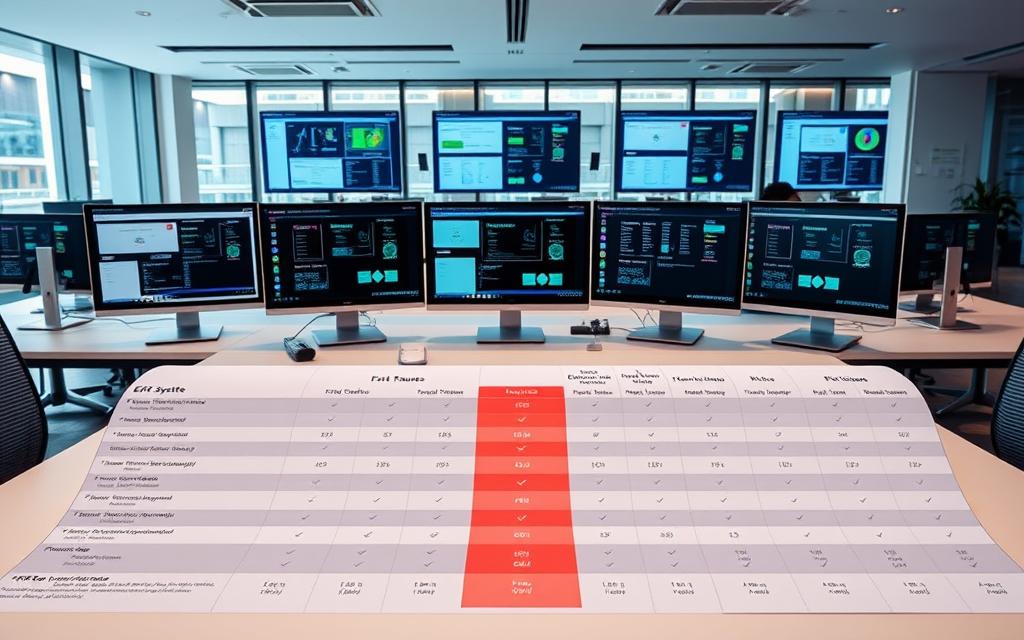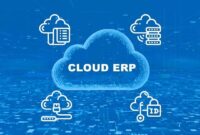In today’s fast-paced business landscape, enterprises need efficient systems to manage their operations. Enterprise Resource Planning ERP tools solutions have become essential for streamlining processes and boosting productivity.
These comprehensive systems integrate various functions, such as finance, human resources, and supply chain management, into a single platform. By implementing ERP software solutions, businesses can enhance collaboration, reduce costs, and make informed decisions.

The right ERP tools can help enterprises stay competitive in a rapidly changing market. By automating routine tasks and providing real-time insights, these solutions enable organizations to respond quickly to new opportunities and challenges.
The Strategic Value of ERP Systems for Business Growth
The strategic importance of ERP systems cannot be overstated, as they provide businesses with the tools needed to navigate complex operational landscapes. Modern enterprises rely on top ERP systems to streamline their operations, enhance productivity, and drive growth.
The Evolution of Enterprise Resource Planning
ERP system software has evolved significantly over the years, from simple inventory management tools to comprehensive business management solutions. Today, best ERP tools integrate various business functions, providing a unified view of the organization.
How ERP Systems Transform Business Operations
By automating routine tasks and providing real-time insights, ERP systems enable businesses to make informed decisions, reduce costs, and improve customer satisfaction.
Key Business Benefits of Modern ERP Solutions
| Benefit | Description |
|---|---|
| Improved Efficiency | Streamlined processes and reduced manual errors |
| Enhanced Decision Making | Real-time data and analytics for informed decisions |
| Scalability | Flexibility to adapt to changing business needs |
By leveraging top ERP systems, businesses can achieve significant growth and remain competitive in today’s dynamic market.
Essential ERP Tools and Functionalities
Effective ERP solutions are crucial for modern enterprises, offering a range of tools and functionalities that drive business efficiency. These systems are designed to streamline operations, enhance productivity, and support informed decision-making.
Core Modules in Comprehensive ERP Systems
Comprehensive ERP systems typically include core modules such as financial management, human capital management, supply chain management, and customer relationship management. These modules are designed to work seamlessly together, providing a unified view of the organization and enabling better resource allocation.
Integration Capabilities with Existing Systems
One of the key features of modern ERP solutions is their ability to integrate with existing systems and third-party applications. This integration capability ensures that businesses can leverage their current technology investments while benefiting from the advanced features of the ERP system.
Analytics and Reporting Features
ERP systems offer advanced analytics and reporting features that enable businesses to gain insights into their operations and make data-driven decisions. These features include real-time reporting, predictive analytics, and customizable dashboards.
Mobile Accessibility and User Experience
Modern ERP solutions prioritize mobile accessibility and user experience, allowing employees to access critical information and perform tasks on-the-go. This mobility enhances productivity and responsiveness, contributing to the overall efficiency of the organization.
| ERP Feature | Description | Benefits |
|---|---|---|
| Core Modules | Financial, HR, Supply Chain, CRM | Unified operations, better resource allocation |
| Integration Capabilities | Seamless integration with existing systems | Leverage current technology, enhanced functionality |
| Analytics & Reporting | Real-time reporting, predictive analytics | Data-driven decisions, operational insights |
| Mobile Accessibility | Access ERP on mobile devices | Enhanced productivity, improved responsiveness |

By understanding and leveraging these essential ERP tools and functionalities, businesses can maximize their investment in ERP solutions and drive significant improvements in operational efficiency and strategic decision-making.
Top ERP Tools for Enterprise-Level Organizations
Top ERP tools for enterprise-level organizations are designed to provide comprehensive solutions for complex business needs. These advanced systems help large enterprises manage their resources more efficiently, streamline operations, and improve overall productivity.
SAP S/4HANA
SAP S/4HANA is a next-generation ERP system that offers real-time processing, simplified data models, and advanced analytics. It is designed to help businesses run more efficiently and make better decisions.
Key Features and Capabilities
SAP S/4HANA includes a range of features such as:
- Real-time data processing and analytics
- Simplified data models for easier maintenance
- Advanced machine learning capabilities
- Integration with other SAP solutions
Industry-Specific Solutions
SAP S/4HANA offers industry-specific solutions for various sectors, including:
| Industry | Solutions |
|---|---|
| Manufacturing | Advanced production planning, inventory management |
| Finance | Risk management, compliance management |
| Retail | Omnichannel retailing, inventory management |

Oracle NetSuite
Oracle NetSuite is a cloud-based ERP solution that provides a comprehensive suite of business management applications. It is designed to help businesses manage their financials, inventory, and customer relationships in real-time.
Key Features and Capabilities
Oracle NetSuite includes features such as:
- Cloud-based infrastructure for scalability
- Real-time financial management
- Advanced inventory management
- Customer relationship management (CRM)
Industry-Specific Solutions
Oracle NetSuite offers solutions tailored to various industries, including:
| Industry | Solutions |
|---|---|
| Wholesale Distribution | Inventory management, order management |
| Manufacturing | Production planning, supply chain management |
| Retail | E-commerce integration, omnichannel retailing |
Microsoft Dynamics365
Microsoft Dynamics365 is a line of enterprise resource planning and customer relationship management software applications. It combines ERP and CRM capabilities to provide a comprehensive business solution.
Key Features and Capabilities
Microsoft Dynamics365 includes features such as:
- Integration with Microsoft Office 365
- Advanced analytics and reporting
- AI-driven insights for better decision-making
- Scalable and flexible architecture
Industry-Specific Solutions
Microsoft Dynamics365 offers industry-specific solutions, including:
| Industry | Solutions |
|---|---|
| Manufacturing | Production planning, inventory management |
| Retail | Omnichannel retailing, customer engagement |
| Finance | Financial management, risk management |
Infor CloudSuite
Infor CloudSuite is a cloud-based ERP solution designed for specific industries. It offers deep industry expertise and a range of functionalities to support complex business needs.
Key Features and Capabilities
Infor CloudSuite includes features such as:
- Industry-specific functionality
- Cloud-based infrastructure for flexibility
- Advanced analytics and reporting
- Integration with other Infor solutions
Industry-Specific Solutions
Infor CloudSuite offers solutions for various industries, including:
| Industry | Solutions |
|---|---|
| Manufacturing | Production planning, supply chain management |
| Healthcare | Patient management, financial management |
| Distribution | Inventory management, order management |
Epicor ERP
Epicor ERP is designed for manufacturing, distribution, and retail businesses. It provides a comprehensive suite of functionalities to support complex business operations.
Key Features and Capabilities
Epicor ERP includes features such as:
- Advanced manufacturing capabilities
- Real-time inventory management
- Financial management and reporting
- Customer relationship management
Industry-Specific Solutions
Epicor ERP offers industry-specific solutions, including:
| Industry | Solutions |
|---|---|
| Manufacturing | Production planning, supply chain management |
| Distribution | Inventory management, order management |
| Retail | Omnichannel retailing, customer engagement |
Cloud ERP Software vs. On-Premise Solutions
Cloud ERP software and on-premise ERP solutions each have their own set of advantages and disadvantages that enterprises must consider when selecting the best ERP tool for their operations.
Benefits of Cloud-Based ERP Systems
Cloud-based ERP systems offer scalability and flexibility, allowing businesses to adapt quickly to changing market conditions. They also reduce the need for upfront capital expenditures on hardware and software.
“The cloud represents a major shift in how businesses operate, providing greater agility and faster deployment times.”
Advantages of Traditional On-Premise Deployment
On-premise ERP solutions provide enterprises with greater control over their data and customization capabilities. They are often preferred by organizations with complex, unique business processes.
Security Considerations for Both Options
Both cloud and on-premise ERP solutions have their own security considerations. Cloud ERP vendors invest heavily in security measures, while on-premise solutions rely on the enterprise’s internal IT resources.
| Feature | Cloud ERP | On-Premise ERP |
|---|---|---|
| Scalability | High | Limited |
| Cost | Subscription-based | Upfront capital expenditure |
| Security | Vendor-managed | Internally managed |
Total Cost of Ownership Comparison
The total cost of ownership (TCO) for cloud ERP and on-premise ERP varies significantly. Cloud ERP typically offers lower TCO due to reduced infrastructure and maintenance costs.

Hybrid ERP Approaches for Enterprise Flexibility
Hybrid ERP approaches offer a balance between the benefits of cloud and on-premise ERP solutions, allowing enterprises to deploy the best of both worlds according to their needs.
ERP Tools Comparison: Selecting the Right Solution
The right ERP solution can significantly impact business operations and growth. With various top ERP systems available, enterprises must carefully evaluate their options to choose the best fit for their needs.
Evaluation Criteria for Enterprise ERP Selection
When comparing ERP tools, enterprises should consider several key factors, including:
- Scalability and flexibility
- Integration capabilities with existing systems
- User experience and training requirements
- Customization options
- Total cost of ownership
Industry-Specific Requirements and Considerations
Different industries have unique requirements for ERP systems. For instance, manufacturing enterprises may need advanced inventory management and supply chain optimization features, while service-based businesses might prioritize project management and time tracking capabilities.

ERP Tools for Small to Medium Enterprises
Small and medium-sized enterprises (SMEs) have different needs compared to larger corporations. Cloud ERP software is often more suitable for SMEs due to its lower upfront costs, faster implementation, and scalability.
Vendor Evaluation and Support Services
The quality of vendor support can significantly impact the success of an ERP implementation. Enterprises should evaluate vendors based on their reputation, support services, and training offerings.
Implementation Timeframes and Resource Requirements
ERP implementation can be a complex and time-consuming process. Enterprises should carefully plan and allocate resources, considering factors such as project timelines, budget, and personnel requirements.
By carefully evaluating these factors and considering their specific needs, enterprises can select the most appropriate ERP solution to drive business growth and efficiency.
Conclusion: Maximizing ROI from Your ERP Investment
Choosing the right Enterprise Resource Planning (ERP) solution is crucial for maximizing return on investment (ROI). As discussed, top ERP tools like SAP S/4HANA, Oracle NetSuite, and Microsoft Dynamics 365 offer a range of functionalities that can transform business operations. When selecting an ERP system, it’s essential to conduct an erp tools comparison to identify the best fit for your organization.
Leading erp software vendors provide comprehensive enterprise resource planning tools that cater to various industry needs. By understanding your business requirements and evaluating vendors, you can make an informed decision that drives business growth and efficiency.
Ultimately, a well-implemented ERP solution can streamline processes, enhance productivity, and provide valuable insights. By maximizing ROI from your ERP investment, you can achieve long-term success and stay competitive in today’s fast-paced business landscape.




